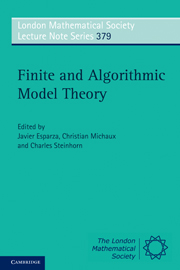Book contents
- Frontmatter
- Contents
- Preface
- 1 Automata-based presentations of infinite structures
- 2 Logical aspects of spatial databases
- 3 Some connections between finite and infinite model theory
- 4 Definability in classes of finite structures
- 5 Algorithmic meta-theorems
- 6 Model theoretic methods for fragments of FO and special classes of (finite) structures
- Bibliography
Preface
Published online by Cambridge University Press: 01 June 2011
- Frontmatter
- Contents
- Preface
- 1 Automata-based presentations of infinite structures
- 2 Logical aspects of spatial databases
- 3 Some connections between finite and infinite model theory
- 4 Definability in classes of finite structures
- 5 Algorithmic meta-theorems
- 6 Model theoretic methods for fragments of FO and special classes of (finite) structures
- Bibliography
Summary
This volume is based on the satellite workshop on Finite and Algorithmic Model Theory that took place at the University of Durham, January 9–13, 2006, to inaugurate the scientific program Logic and Algorithms held at the Isaac Newton Institute for Mathematical Sciences during the first six months of 2006. The goal of the workshop was to explore the emerging and potential connections between finite and infinite model theory, and their applications to theoretical computer science. The primarily tutorial format introduced researchers and graduate students to a number of fundamental topics. The excellent quality of the tutorials suggested to the program organizers, Anuj Dawar and Moshe Vardi, that a volume based on the workshop presentations could serve as a valuable and lasting reference. They proposed this to the workshop scientific committee; this volume is the outcome.
The Logic and Algorithms program focused on the connection between two chief concerns of theoretical computer science: (i) how to ensure and verify the correctness of computing systems; and (ii) how to measure the resources required for computations and ensure their efficiency. The two areas historically have interacted little with each other, partly because of the divergent mathematical techniques they have employed. More recently, areas of research in which model-theoretic methods play a central role have reached across both sides of this divide. Results and techniques that have been developed have found applications to fields such as database theory, complexity theory, and verification.
- Type
- Chapter
- Information
- Finite and Algorithmic Model Theory , pp. vii - xiiPublisher: Cambridge University PressPrint publication year: 2011

